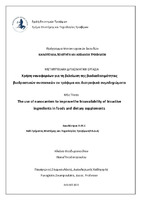| dc.contributor.advisor | Zoumpoulakis, Panagiotis | |
| dc.contributor.author | Θεοδωροπούλου, Ηλιάνα | |
| dc.date.accessioned | 2023-11-14T07:47:25Z | |
| dc.date.available | 2023-11-14T07:47:25Z | |
| dc.date.issued | 2023-09 | |
| dc.identifier.uri | https://polynoe.lib.uniwa.gr/xmlui/handle/11400/5641 | |
| dc.identifier.uri | http://dx.doi.org/10.26265/polynoe-5478 | |
| dc.description.abstract | Η νανοτεχνολογία μέσα από καινοτόμες τεχνολογίες και μεθόδους βρίσκει εφαρμογή στην
επιστήμη και τεχνολογία τροφίμων, τη διατροφή αλλά και την υγεία. Συγκεκριμένα, τα
νανοσυστήματα μεταφοράς βιοδραστικών ενώσεων συμβάλλουν στην παράταση της διάρκειας
ζωής, στη διατήρηση της ποιότητας των τροφίμων, στην προστασία από την ενζυμική, χημική ή
μικροβιακή αλλοίωση αλλά και στη βελτίωση των οργανοληπτικών χαρακτηριστικών των τροφίμων
και των διατροφικών συμπληρωμάτων. Ιδιαίτερο ενδιαφέρον παρουσιάζει η διερεύνηση της χρήσης
των νανοφορέων με σκοπό τη βελτίωση της βιοδιαθεσιμότητας των βιοδραστικών συστατικών,
έχοντας ως απώτερο στόχο την ενίσχυση της δράσης τους στον ανθρώπινο οργανισμό.
Η συγκεκριμένη μελέτη αφορά στη βιβλιογραφική ανασκόπηση για τη χρήση νανοφορέων
με στόχο τη βελτίωση της βιοδιαθεσιμότητας βιοδραστικών συστατικών σε τρόφιμα και διατροφικά
συμπληρώματα. Στόχος είναι η ανάδειξη των τελευταίων επιστημονικών επιτευγμάτων στον τομέα
αυτό αλλά και η σημασία χρήσης νανοφορέων σε τρόφιμα και διατροφικά συμπληρώματα για τη
βελτίωση των ιδιοτήτων τους. Στο πρώτο κεφάλαιο της παρούσας εργασίας πραγματοποιήθηκε μια
εισαγωγή στον τομέα των νανοφορέων όπου γίνεται αναφορά στα είδη και τις εφαρμογές τους στα
τρόφιμα καθώς και στα προβλήματα βιοδιαθεσιμότητας των βιοδραστικών συστατικών στα
τρόφιμα και τα διατροφικά συμπληρώματα. Παράλληλα αναφέρονται οι προκλήσεις και οι
προοπτικές εξέλιξης αυτών των εφαρμογών. Στο δεύτερο κεφάλαιο γίνεται αναφορά στα μικρο- και
νανογαλακτώματα με έμφαση στους τρόπους παρασκευής τους και στις εφαρμογές σε τρόφιμα και
διατροφικά συμπληρώματα. Αντίστοιχα τα κεφάλαια 3 και 4 μελετώνται συγκεκριμένα τα
λιποσώματα και τα πολυμερικά νανοσωματίδια που περιλαμβάνουν τις κυκλοδεξτρίνες και τις
υδρογέλες.
Στο πλαίσιο αυτής της εργασίας περιγράφονται εκτενώς τα είδη των συστημάτων
μεταφοράς βιοδραστικών ενώσεων που συνηθέστερα μελετώνται σε εφαρμογές τροφίμων και
διατροφικών συμπληρωμάτων. Αναφέρονται οι τρόποι παρασκευής, οι βασικότερες εφαρμογές
αλλά και οι προκλήσεις του τομέα. Στα συμπεράσματα καταγράφονται τα σημαντικότερα
επιτεύγματα των εφαρμογών που μελετήθηκαν, γίνεται μικρή αναφορά σε εταιρείες που έχουν
υιοθετήσει τη νανοτεχνολογία στη γραμμή παραγωγής τους ενώ παράλληλα αναγνωρίζονται τα
κενά γνώσης και οι μελλοντικές προτάσεις για εξέλιξη. | el |
| dc.format.extent | 61 | el |
| dc.language.iso | el | el |
| dc.publisher | Πανεπιστήμιο Δυτικής Αττικής | el |
| dc.rights | Αναφορά Δημιουργού - Μη Εμπορική Χρήση - Παρόμοια Διανομή 4.0 Διεθνές | * |
| dc.rights | Attribution-NonCommercial-NoDerivatives 4.0 Διεθνές | * |
| dc.rights | Attribution-NonCommercial-NoDerivatives 4.0 Διεθνές | * |
| dc.rights | Attribution-NonCommercial-NoDerivatives 4.0 Διεθνές | * |
| dc.rights.uri | http://creativecommons.org/licenses/by-nc-nd/4.0/ | * |
| dc.subject | Νανοβιοτεχνολογία | el |
| dc.subject | Βιοδιαθεσιμότητα συστατικών | el |
| dc.subject | Κυκλοδεξτρίνες | el |
| dc.title | Χρήση νανοφορέων για τη βελτίωση της βιοδιαθεσιμότητας βιοδραστικών συστατικών σε τρόφιμα και διατροφικά συμπληρώματα | el |
| dc.title.alternative | The use of nanocarriers to improve the bioavailability of bioactive ingredients in foods and dietary supplements | el |
| dc.type | Μεταπτυχιακή διπλωματική εργασία | el |
| dc.contributor.committee | Σινάνογλου, Βασιλεία | |
| dc.contributor.committee | Στρατή, Ειρήνη | |
| dc.contributor.faculty | Σχολή Επιστημών Τροφίμων | el |
| dc.contributor.department | Τμήμα Επιστήμης και Τεχνολογίας Τροφίμων | el |
| dc.contributor.master | Καινοτομία, Ποιότητα και Ασφάλεια Τροφίμων | el |
| dc.description.abstracttranslated | Nanotechnology, through innovative technologies and methods, finds application in food
science and technology, nutrition and health. In particular, nanosystems for the transport of
bioactive compounds contribute to extending the shelf life, maintaining the quality of food,
protecting it from enzymatic, chemical or microbial spoilage and improving the organoleptic
characteristics of food and nutritional supplements. Of particular interest is the investigation of the
use of nanocarriers in order to improve the bioavailability of bioactive components, with the
ultimate goal of enhancing their activity in the human body.
This particular study provides a literature review on the use of nanocarriers to improve the
bioavailability of bioactive ingredients in food and nutritional supplements. The aim is to highlight
the latest scientific achievements in this field, as well as the importance of using nanocarriers in food
and nutritional supplements in order to improve their properties. In the first chapter of this study, an
introduction to the field of nanocarriers is provided, where the definitions, the types of nanocarriers
and their applications in food are mentioned, as well as the problems of bioavailability of bioactive
ingredients in food and nutritional supplements. At the same time, the challenges and the future
perspectives of these applications are mentioned. In chapter 2, reference is made to micro- and
nanoemulsions with an emphasis on preparation methods and the literature review including
applications in food and nutritional supplements. Accordingly, chapters 3 and 4 study liposomes and
polymeric nanoparticles, including cyclodextrins and hydrogels. Chapter 5 include the conclusions
and the proposals for future actions. Finally, literature is listed.
In the context of this study, the types of the most commonly used nano-systems in food and
food supplement applications were extensively described. The methods of preparation, the most
principal applications and the challenges of the sector were mentioned. In the conclusions, the most
important achievements of the studied applications are provided, and a small part is dedicated to
companies that have adopted nanotechnology in their production line, while knowledge gaps and
future proposals for the development of existing studies are recognized | el |



